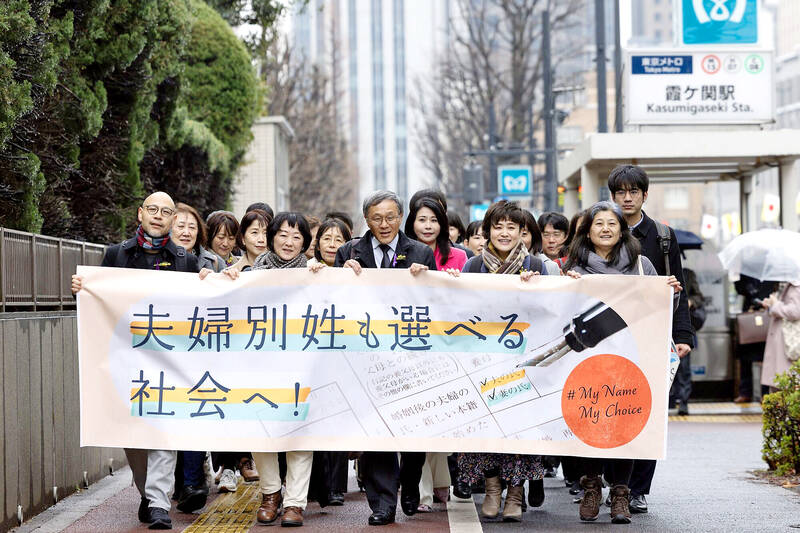A powerful Japanese business lobby is calling on the government to allow married couples to keep dual surnames, saying the lack of freedom to do so hinders women’s advancement and has even become a business risk.
In Japan, each wedded pair has to legally adopt one family name. While either surname can be used, 95 percent of women still traditionally adopt their husbands’, according to a 2022 government survey. Experts say such law only exists in Japan and have even accused it of putting women off marriage in a country already suffering dwindling nuptials.
Keidanren, or The Japan Business Federation, said on June 10 the law has to be revised to fit a more diverse, equal and inclusive Japanese society.

Photo: Bloomberg 照片:彭博社
This came months after about a dozen plaintiffs filed a lawsuit asking for the system to be changed.
“As women play more active roles and the number of female executives is on the rise, the surname issue has become a business risk that companies can no longer dismiss as a problem of certain individuals,” said Masakazu Tokura, head of Keidanren.
Tokura said many Japanese career women are already using their maiden names at work and on their business cards, including 90 percent of Keidanren female members. However, they still have to use their unified surnames on all legal documents, causing them issues when — for example — opening bank accounts, issuing credit cards, and traveling overseas as the names don’t match, he said.

Photo: AP 照片:美聯社
Keidanren internally surveyed its members and 88 percent of female executives expressed dissatisfaction with the status quo.
The proposal by the organization — which boasts over 1,500 Japanese companies and has regularly made economic policy recommendations — is seen as unusual for it has customarily supported Japanese Prime Minister Fumio Kishida’s conservative governing Liberal Democratic Party that has shelved the dual surname idea for over three decades.
Tokura says the proposal will be submitted to the government this week following approval by the lobby’s board meeting. They also called on the parliament to swiftly support a change in the 1898 civil code which governs the adoption of surnames.
On June 10, when asked about the proposal, Chief Cabinet Secretary Yoshimasa Hayashi of the governing party said the public had varied opinions on the matter and that careful discussion was needed.
However, several surveys show the vast majority support a dual-surname household, and the ruling LDP, which also opposes same-sex marriage, is already facing growing calls to allow more diversity in family values and marriage. Many in the party support traditional gender roles and a paternalistic family system, arguing that allowing the dual-surname option would destroy family unity.
In 2015 and 2021, the Supreme Court found said the one-surname-only policy wasn’t unconstitutional but urged parliament to discuss the issue. But deliberations have stalled due to opposition by the governing party conservatives.
Akari Takahashi, a 22-year-old wedding planner, said she never questioned adopting her father’s surname until she traveled to Australia and her host mother expressed discontent with the idea of a unified family name.
“That’s when I realized something was wrong with it,” Takahashi said, adding she couldn’t imagine having to make such a choice.
The rights gap between men and women in Japan is among the world’s largest with Japan ranking 125th in a 146-nation survey by the World Economic Forum for 2023.
(AP)
日本一個強大的商業遊說團體呼籲政府,允許已婚夫婦保留雙方的姓氏(「夫婦別姓」),並表示不能保留姓氏阻礙了女性的晉升,甚至成了商業風險。
在日本,每對已婚夫婦都必須採用同一個姓氏(「夫婦同姓」),以符合法律規定。根據2022年政府調查,雖然可以使用雙方任一姓氏,但95%的女性傳統上仍採用丈夫的姓氏。專家表示,這樣的法律只存在於日本,甚至指責該法律讓這結婚人口已在下降的國家推遲了女性的結婚時間。
日本經濟團體聯合會(簡稱「經團聯」)6月10日表示,必須修改該法律,以適應更多元化、平等和包容的日本社會。
數月前,約十多名原告提起訴訟,要求改變此制度。
經團聯會長十倉雅和表示:「女性扮演了更活躍的角色,女性高階主管也在增加,姓氏問題已隨之成為一種商業風險,企業不能再將其視為一些個別問題而加以忽視」。
十倉表示,日本許多職業女性已在工作和名片上使用她們結婚前的姓氏,其中包括90%的經團聯女性會員。然而,她們仍必須在所有法律文件上使用與丈夫統一的姓氏,這會導致他們在開立銀行帳戶、核發信用卡及出國旅行時因姓名不符而出現問題,他舉例說。
經團聯對其會員所做的調查顯示,88%的女性主管對現狀表示不滿。
經團聯擁有超過1,500 家日本公司,並定期提出經濟政策建議。經團聯夫婦別姓的提議被視為不尋常,因為該組織一向支持日本首相岸田文雄所屬的保守派執政黨自民黨,夫婦別姓的議題三十多年來一直被該黨擱置。
十倉表示,該提案將在本週該遊說團體理監事會議批准後交給政府。他們還呼籲國會迅速支持修改1898年開始施行的日本民法典,該法典規定了姓氏的採用。
執政黨內閣官房長官林芳正6月10日被問及該提案時表示,民眾對此事有各種不同的意見,需要仔細討論。
然而,多項調查顯示,絕大多數人支持雙姓家庭,而執政的自民黨同時也反對同性婚姻,已面對越來越多呼聲,要求允許更多樣化的家庭價值觀與婚姻。自民黨內許多人支持傳統的性別角色與家長式的家庭制度,認為允許選擇夫婦別姓會破壞家庭團結。
2015年及2021年,日本最高法院裁定夫婦同姓制並不違憲,但敦促國會討論此議題。但由於執政黨保守派的反對,審議工作陷入停滯。
22 歲的婚禮規劃師高橋明里〔音譯〕表示,她從未質疑過為何要從父姓,直到她去到澳洲,寄宿家庭媽媽對夫婦同姓的概念表示不滿。
高橋說:「就在那時我意識到這有些不對勁」。她補充說,她無法想像有此選項,得去決定要姓什麼。
日本是世界上男女權利差距最大的一些國家之一,在世界經濟論壇2023年對146個國家所做的調查中,日本排名第125 位。
(台北時報林俐凱編譯)

A: Recently, I’ve been seeing mosquitoes flying around in front of my eyes. The doctor said it’s the “flying-mosquito disease.” B: Flying mosquitoes? What a strange name. A: They’re actually called “floaters” in English, meaning floating debris. When fibrous substances in the vitreous body inside the eyeballs increase, floaters can appear in the visual field. B: Oh my goodness. Can you get rid of them? A: According to ophthalmologist Horng Chi-ting’s research, taking the enzymes of certain fruits is likely to help reduce floaters. A: 我最近一直覺得眼前有蚊子飛來飛去,結果醫生說是「飛蚊症」。 B: 飛蚊症?好奇怪的病名。 A: 英文名稱叫「floaters」, 也就是漂浮物的意思。 因為眼球的玻璃體中纖維化物質增多,導致視野出現漂浮物。 B: 天啊!要怎麼把蚊子趕走? A:

In Taiwan, people can use a platform to rent a power washer for a weekend or share unused garage space for someone’s storage needs. These are examples of the sharing economy, a consumption model that has gained widespread adoption worldwide. This approach allows people to rent or share assets like cars, homes or even services, typically through online platforms. This innovative model poses a simple yet powerful question: why purchase infrequently used items when sharing is more practical? By making useful but idle resources accessible, the sharing economy turns them into sustainable opportunities. Internationally, platforms like Airbnb and Uber have popularized

Bilingual Story is a fictionalized account. 雙語故事部分內容純屬虛構。 I stand by the Miluo River as dusk falls. The court betrayal is too much. I served Chu with loyalty. I forged alliances and fought corruption. But the whispers of jealous courtiers, the murmurs of treason, spoke louder. The king cast me out. The water looks calm. It promises peace. I step in. The river is cold against my legs. I hear shouts behind me — fishermen calling my name. I keep walking. The calls grow louder, but I do not turn around. The water rises to my chest. It pulls at me. I

A: What types of fruit enzymes should we take to help reduce eye floaters? B: According to a study published in the “Applied Sciences” journal by Taiwanese ophthalmologist Horng Chi-ting, pineapple, papaya and fig supplements can improve symptoms. A: Pineapples are in season now, so you should munch on more of those to get rid of floaters. B: Not quite. Enzymes can be damaged by our stomach acid if we eat the fruit directly. The doctor says taking fruit enzyme capsules is better for absorption. A: Most importantly, we should reduce our use of personal electronics to prevent floaters from